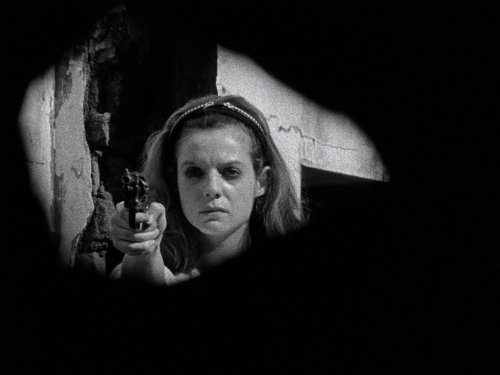
The latest feature from Portuguese auteur Miguel Gomes might look like a forbidding cinemathèque-type item. Actually, it's a gem: gentle, eccentric, possessed of a distinctive sort of innocence – and also charming and funny. Gomes has here something of Manoel de Oliveira's slightly stately deportment, and this is the kind of modern-day mystery of Lisbon that would might have interested the late Raúl Ruiz. There is plenty of deadpan wit and fun, and Gomes has Kaurismäki's love of musical interludes, bringing on a guitar band and just letting them play.
Peter Bradshaw1
“Gomes’s vision, realized in calmly expansive, keenly perceptive compositions in a charcoal black-and-white, is two-fold. First, he reveals a rational modern Europe of noble yet sterile passions, of moderate pleasure, impotent principle, and economized energy; of an aestheticized dignity that is ever so slightly out of sync with the tawdry mercenary activity of daily life. [...] Second, Gomes sees the predatory injustices of colonial life as a sort of Wild West of anarchic self-indulgence and self-reinvention, a perfect environment for romance to flower and to grow to monstrous, untenable dimensions. Nothing suggests nostalgia for or ambivalence about Portugal’s colonial empire. The narrator of the second part, an Italian immigrant, is clear-eyed about the indecent inequities that he took advantage of, and it’s among the sins for which the modern Portugal of Pilar’s circle is in lasting penance. But the very vastness of its cavalier moral obliviousness is one of the things that vanishes with the clarity of vision; amour fou comes off inextricably linked to diabolical evil (which is explicitly invoked in the narration), and the humanist’s circumspect, responsible politics appear also to put relationships on an ethical footing and to put a brake on the emotional life - without completely extinguishing the inner spark of spontaneous extremes. [...] It’s not a film of a nostalgic anti-modernity; it’s a model of imaginative freedom and audacity in a supremely, sublimely modern vein.”
Richard Brody2
“Tabu van Murnau en Flaherty is daar natuurlijk een van de grootste voorbeelden van”, kadert Gomes. ”Een film zonder acteurs op een eiland in de Pacific, dat tegelijkertijd een van de mooiste melodrama’s is die de cinema heeft voortgebracht. Die film toont Murnaus schitterende capaciteit om te controleren als een van de meest getalenteerde metteurs-en-scène. Tegelijk is het mogelijk om zonder acteurs te werken. Niet in een studio, maar op een eiland ver weg van Hollywood en de filmindustrie. Tabu is dus een goed vroeg voorbeeld van dat verkeer tussen realiteit en verbeelding. Lisandro Alonso’s La libertad [de Argentijnse film uit 2001 die nauwgezet een dag uit het leven van een houthakker volgt, rd] is volgens mij een van de belangrijkste films van de laatste jaren. Zelfs al is Lisandro een zeer goede vriend van mij, ook hij heeft dat niet uitgevonden. Velen, van Roberto Rossellini tot Jean Renoir, lieten de ruimte en mogelijkheid om dingen op te pikken uit de wereld, maar er ook fictie mee te construeren. Al spreek ik liever van realiteit en verbeelding dan van documentaire en fictie. Bij mijn vorige film heb ik bijvoorbeeld gemerkt dat daar in de realiteit een grote drang bestond om dingen in te beelden: liederen met absurde teksten op karaokes, vuurwerk, het dorpsritueel van de man die eenmaal per jaar van de brug in de rivier springt, dat soort zaken. Ze produceren hun eigen shows. Het zijn vormen van spektakel, van fictie. Ze voorzien de gemeenschap van verbeelding. Ik denk dat in het echte leven, in realiteit, beide al gemixt zijn. Cinema is een manier om hiermee te werken, maar is gegrond in de realiteit.””
Ruben Demasure3
- 1Peter Bradshaw, “Tabu – review,” The Guardian, 6 september 2012.
- 2Richard Brody, ““Tabu” and its defiant insights,” The New Yorker.
- 3Ruben Demasure, “Ventura: een avontuur in herinneren en vergeten | Portugese filmmakers Miguel Gomes en Pedro Costa in Brussel”, Kifkif, 29 augustus 2013.